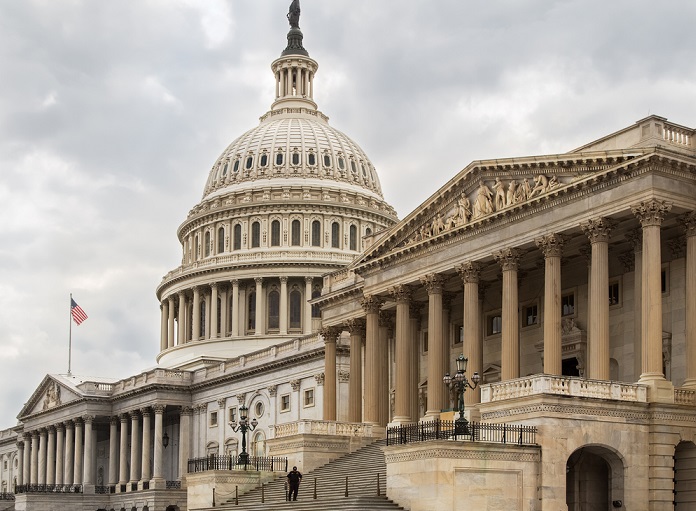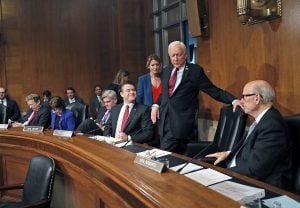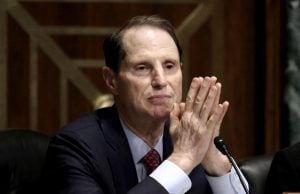 The retirement reform bill reduces small employers' fiduciary liability, simplifies 401(k) safe harbor rules, and much more. (Photo: Shutterstock)
The retirement reform bill reduces small employers' fiduciary liability, simplifies 401(k) safe harbor rules, and much more. (Photo: Shutterstock)
Sen. Orin Hatch, R-UT, and Sen. Ron Wyden, D-OR, have reintroduced the Retirement Enhancement and Savings Act, a sweeping retirement reform bill first introduced in 2016 that sailed through the Senate Finance Committee on a unanimous vote.
The reemergence of the bipartisan legislation comes two weeks before the March 23 deadline for the $1.3 trillion omnibus spending bill, which would fund the government through the end of fiscal year 2018 and must be passed to avoid a government shutdown.
Recommended For You
Omnibus spending bills are typically loaded with riders attached to the must-pass legislation, raising the specter of whether Senators Hatch and Wyden, the chair and ranking member of the Senate finance committee, respectively, are angling to have RESA considered in budget negotiations.
"We hope that's the vehicle it (RESA) will be considered with," said a spokesperson with the American Council of Life Insurers, one of the many insurance, financial services, and plan sponsor advocacies that strongly back the legislation.
The original bill, more than 150 pages long, is designed to increase the adoption of defined contribution plans in the small employer market, among other things.
RESA removes existing regulatory barriers to multiple employer plans, which allow small employers to pool participants under one retirement plan. The bill reduces small employers' fiduciary liability under the Employee Retirement Income Security Act.
It would also lift the 10 percent cap on deferrals in plans that auto-enroll participants under a Labor Department safe harbor, and simplify other 401(k) safe harbor rules.
Small employers would be incentivized to start retirement plans with an increased tax credit of up to $5,000 for three years. RESA also creates a new tax credit for small employers that automatically enroll workers in plans.
Annuities in defined contribution plans would be portable, allowing participants to avoid surrender charges when changing employers and plans. RESA also would update Labor's employer safe harbor for selecting annuity providers, and require lifetime income estimates on defined contribution account statements.
The heavy guns on retirement reforms
Senators Hatch and Wyden are among Congress' heaviest hitters on retirement policy.
All of their influence may be necessary to move RESA onto the docket as lawmakers and the White House brace for battle over the budget.
 Senator Orrin Hatch (AP Photo/Alex Brandon)
Senator Orrin Hatch (AP Photo/Alex Brandon) Other potential riders—and bargaining chips–to the Omnibus reportedly include deeply divisive issues like the border wall, amnesty for the Dreamers, gun control measures, funding for the Affordable Care Act's individual subsidies, and even funding for Planned Parenthood.
"We need to do this Omnibus," said Senate majority leader Mitch McConnell, R-KY, in a press conference this week. "I'm confident we're going to get there. Bipartisan talks have been good. I can't predict for you what extraneous items may be included, but there almost always are some."
That RESA was reintroduced as Omnibus negotiations ratchet up is likely not a coincidence, sources told BenefitsPRO.
"RESA is a bill that's time has come," said Paul Richman, vice president of government affairs at the Insured Retirement Institute.
 Sen. Ron Wyden, D-Ore. (AP Photo/Lauren Victoria Burke, File)
Sen. Ron Wyden, D-Ore. (AP Photo/Lauren Victoria Burke, File) "My understanding is that leadership in both chambers are looking for riders that have strong bipartisan support to make it on to the Omnibus. RESA is a great candidate for that," added Richman.
While RESA does not have a companion bill in the House, several pieces of proposed legislation in that chamber feature policies included in Senators Hatch and Wyden's bill.
"Nobody has raised objections about any of the substantive provisions in RESA," noted Richman, who said IRI has been actively engaged with lawmakers on both sides of the aisle in the past weeks.
Notwithstanding RESA's unanimous support on the Senate Finance Committee, there are no guarantees that it will make it into the Omnibus bill, cautioned Geoff Manville, principal, government relations at Mercer.
"Getting it by the House may be something of a challenge, even though a number of House bipartisan bills embrace discrete provisions right out of RESA," said Manville.
"Any time you get a must-bass bill, it's one of the last legislative trains to leave the station for the year. Lawmakers will try to get their priorities attached. That can give other lawmakers severe heartburn and bog the process down," added Manville.
A number of lawmakers are calling for a clean spending bill—namely Senate Democrats that are concerned Republicans will insist on more politically charged riders.
RESA of course stands as an uncontroversial alternative to potential riders on the ACA and immigration policy.
"If ranking member Wyden and the other Democrats on the Senate Finance Committee are on board, that's clearly a positive indicator," said Manville.
RESA also comes with a nominal price tag, which both Richman of the IRI and Mercer's Manville said bodes well for its prospects.
In fact, an analysis of the bill by the Joint Committee on Taxation in 2016 found it actually added $4 million in revenue to federal coffers. The cost of creating open MEPs, and other provisions of the bill, were offset by revenue raised from increased penalties for failing to file Form 5500 documents.
"If you take the long view, and believe as many of us in industry do that these provisions would expand retirement coverage and improve overall retirement security, that would alleviate some of the pressure on over-extended entitlement programs," said Manville.
© 2025 ALM Global, LLC, All Rights Reserved. Request academic re-use from www.copyright.com. All other uses, submit a request to [email protected]. For more information visit Asset & Logo Licensing.








